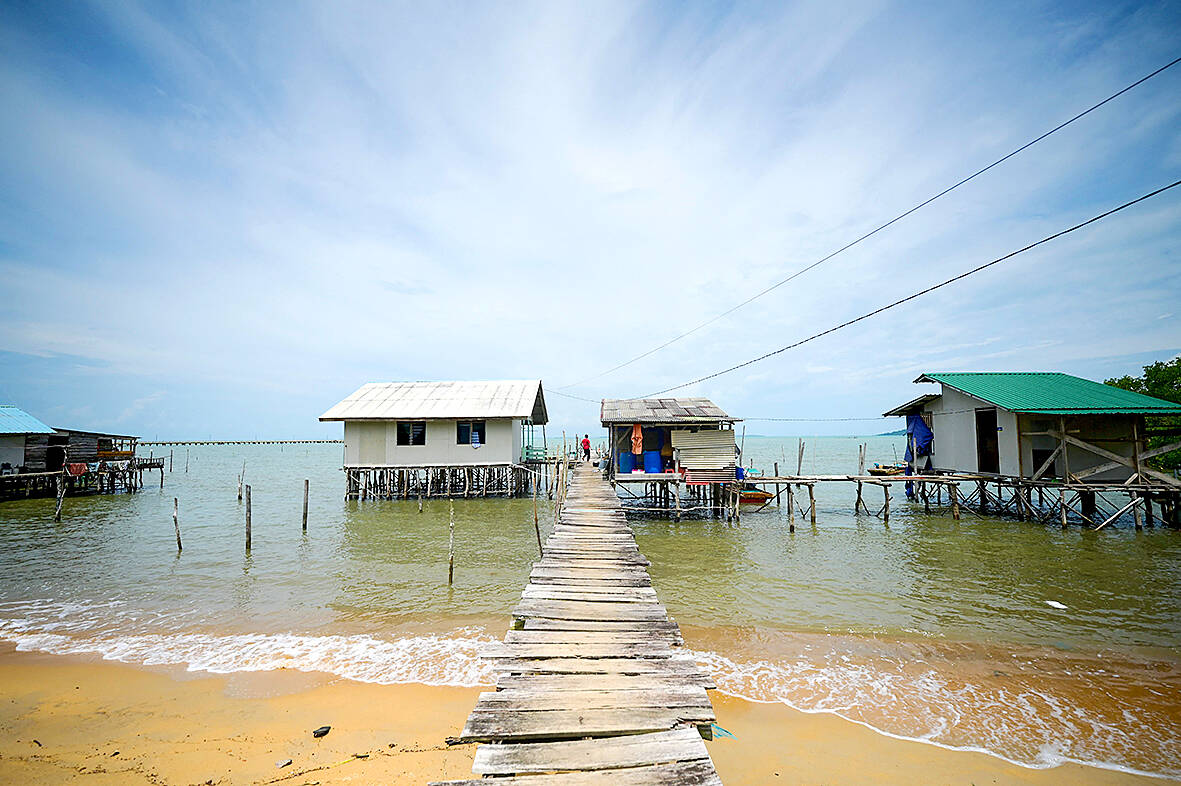Sitting on a creaky bridge linking stilt houses, Indonesian fisherman Sadam Husen fears for his people and their traditions, knowing they may be uprooted from their ancestral land to make way for a China-funded megaproject worth billions.
The Indonesian government recently told Rempang island’s 7,500 residents to pack their bags and leave by the end of last month.
Residents say their families have been present on the South China Sea island for more than a century, mostly earning a living as fishermen, catching fresh snapper, shrimp and sea cucumbers.

Photo: AFP
But under government plans the villagers, who include members of the Malay and Orang Darat tribes, are to be relocated away from their homes and replaced by a huge quartz sand processing plant. Experts say the move will leave them jobless and potentially erase their way of life from the island forever.
“It’s getting more tense. We have no interest in going out to sea,” said 32-year-old islander Husen, who has peacefully protested the eviction plan. “The most important thing is to save our village,” Husen said.
“I have not been able to sleep for a month thinking about my village.”

Photo: AFP
Jakarta says one of the world’s biggest glass and solar panel makers, Hong Kong-listed Xinyi Glass, will invest US$11.6 billion in the plant after a July deal struck between President Joko Widodo and Chinese counterpart Xi Jinping (習近平).
Residents say authorities turned up at their villages to survey the land in preparation for the project’s construction — sparking protests attended by thousands.
On Batam island, which neighbors Rempang, demonstrations outside government offices turned into clashes with police. Protesters used Molotovs, stones and glass bottles, according to officials and police, who responded with tear gas and water cannon.

Photo: AFP
Dozens of locals were arrested and hundreds of riot police were deployed.
Another protest was held outside the Chinese embassy in Jakarta.
‘THEIR EXISTENCE IS THREATENED’
The Indonesian government has said construction work on the plant will begin next year, and that it will transform the island into an “eco-city” attracting thousands of jobs and billions in investment by 2080.
Xinyi Glass did not respond to a request for comment.
Beijing has poured billions into natural resources in Indonesia in recent years, particularly nickel on Sulawesi island.
For now, the protests appear to be paying off, if only temporarily.
The government has suggested moving residents to other locations on Rempang, rather than off the island entirely, and postponed last month’s eviction date.
While no new date has been announced, the locals say it is only a matter of time before they are evicted.
“Their existence is undoubtedly threatened by this project. The fishing community will be severely threatened on land and at sea,” said Parid Ridwanuddin, coastal and marine campaign manager at Indonesian NGO Walhi.
“The fishermen on Rempang island will vanish.”
‘I WILL NOT SIGN’
A villager who declined to be named said she would not bow to government pressure or compensation offers.
“If God wants this to happen there is nothing I can do. I will stay put and not sign,” she said.
The 17,000-hectare island near the Malacca Strait, one of the world’s busiest shipping routes, is rich in the quartz sand needed to make solar panels — and the government aims to develop an industrial zone there.
On Rempang, authorities have identified around 700 affected families.
Each has been promised 500 square meters of land and a 45-square-metre house worth around 120 million rupiah (US$7,800) in compensation. Islanders have been told they will first be housed in apartments on neighboring Batam, each receiving 1.2 million rupiah monthly for half a year while the replacement houses are built.
“We all agree that Indonesia needs money to pour in, and one of the ways is through investment,” Batam city mayor Muhammad Rudi said. “If they (China) get scared and leave, what will become of Rempang?”
But residents say they have received no guarantees the compensation pledges will be honored — particularly as the government disputes their claim to have official deeds that prove their land or home ownership.
“So far it is just talk,” said Timo, a 67-year-old village community leader, who like many Indonesians has one name. While the authorities are demanding deeds, NGOs say Indonesia’s agrarian laws recognize the community’s ancestral relationship with land and sea resources. “The government must affirm and serve the community’s right to the land by granting land rights,” said Walhi’s Ridwanuddin.
‘CLIMATE OF FEAR’
On the one-hour drive from Batam island to Rempang, banners and stickers urging people to relocate plaster the roadside. There is a heavy police and military presence on the streets near Sembulang, one of the villages under orders to evacuate.
The unnamed villager said police officers and government officials have been knocking door to door, urging people to move.
“I am afraid they will enter my house in the middle of the night and force me out,” she said.
Mayor Rudi denied his staff had intimidated residents.
Amnesty International Indonesia said the police deployment had “created a climate of fear.”
The government claims the project will take up 2,300 hectares, while leaving 10,000 hectares of conservation land untouched. But it could damage Rempang’s marine life, pollute the area and over-exploit its vast sand resources, according to Walhi.
Residents are also wary that potential jobs will be occupied by more skilled Chinese workers.
“Even if our local workers are employed, they might be hired as blue-collar workers,” said Timo, the community leader.
Like many other villagers, Timo said he feared for his relatives’ graves and their possible desecration because of the project’s construction.
“We will never want to be relocated,” he said.
“Our hearts feel heavy. For us this is the final price.”

March 10 to March 16 Although it failed to become popular, March of the Black Cats (烏貓進行曲) was the first Taiwanese record to have “pop song” printed on the label. Released in March 1929 under Eagle Records, a subsidiary of the Japanese-owned Columbia Records, the Hoklo (commonly known as Taiwanese) lyrics followed the traditional seven characters per verse of Taiwanese opera, but the instrumentation was Western, performed by Eagle’s in-house orchestra. The singer was entertainer Chiu-chan (秋蟾). In fact, a cover of a Xiamen folk song by Chiu-chan released around the same time, Plum Widow Missing Her Husband (雪梅思君), enjoyed more

Last week Elbridge Colby, US President Donald Trump’s nominee for under secretary of defense for policy, a key advisory position, said in his Senate confirmation hearing that Taiwan defense spending should be 10 percent of GDP “at least something in that ballpark, really focused on their defense.” He added: “So we need to properly incentivize them.” Much commentary focused on the 10 percent figure, and rightly so. Colby is not wrong in one respect — Taiwan does need to spend more. But the steady escalation in the proportion of GDP from 3 percent to 5 percent to 10 percent that advocates

From insomniacs to party-goers, doting couples, tired paramedics and Johannesburg’s golden youth, The Pantry, a petrol station doubling as a gourmet deli, has become unmissable on the nightlife scene of South Africa’s biggest city. Open 24 hours a day, the establishment which opened three years ago is a haven for revelers looking for a midnight snack to sober up after the bars and nightclubs close at 2am or 5am. “Believe me, we see it all here,” sighs a cashier. Before the curtains open on Johannesburg’s infamous party scene, the evening gets off to a gentle start. On a Friday at around 6pm,

A series of dramatic news items dropped last month that shed light on Chinese Communist Party (CCP) attitudes towards three candidates for last year’s presidential election: Taiwan People’s Party (TPP) founder Ko Wen-je (柯文哲), Terry Gou (郭台銘), founder of Hon Hai Precision Industry Co (鴻海精密), also known as Foxconn Technology Group (富士康科技集團), and New Taipei City Mayor Hou You-yi (侯友宜) of the Chinese Nationalist Party (KMT). It also revealed deep blue support for Ko and Gou from inside the KMT, how they interacted with the CCP and alleged election interference involving NT$100 million (US$3.05 million) or more raised by the